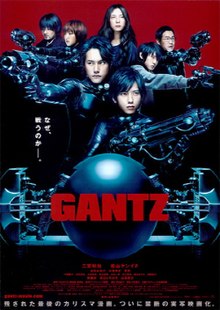
Gantz is a Japanese manga series written and illustrated by Hiroya Oku. It was serialized in Shueisha's seinen manga magazine Weekly Young Jump from June 2000 to June 2013, with its chapters collected in 37 tankōbon volumes. It tells the story of Kei Kurono and Masaru Kato, both of whom died in a train accident and become part of a semi-posthumous "game" in which they and several other recently deceased people are forced to hunt down and kill aliens armed with a handful of futuristic items, equipment, and weaponry.

Kazunari Ninomiya, often called Nino (ニノ), is a Japanese singer, songwriter, actor, voice actor, presenter and radio host. He is a member of the Japanese idol group Arashi, group that is under agent contract with Starto Entertainment.

Kenichi Matsuyama is a Japanese actor. He is known for his affinity for strange character roles, and he is best known internationally for playing L in the 2006 films Death Note, Death Note 2: The Last Name and L: Change the World in 2008. He was cast to play lead character Toru Watanabe in the film adaptation of Haruki Murakami's novel Norwegian Wood, which was released in December 2010.
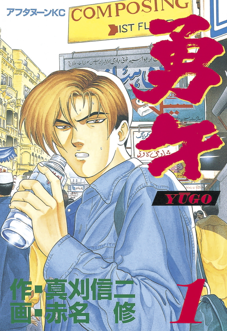
Yugo is a Japanese manga series written by Shinji Makari and illustrated by Akana Shu. It was serialized in Kodansha's Afternoon magazine from 1994 to 2004. The series was transferred to Evening magazine where the subtitle "the Negotiator" is added in. Subsequent compilations of the original manga also add this phrase. The manga was adapted into an anime television series in 2004 as Yugo the Negotiator. The anime comprises the manga's first two major arcs, which fit within 13 episodes.

Detroit Metal City is a Japanese manga series written and illustrated by Kiminori Wakasugi. It was serialized in Hakusensha's seinen manga magazine Young Animal from September 2005 to April 2010, with its chapters collected in ten tankōbon volumes. The manga was licensed for English release in North America by Viz Media. The series takes its name from the song "Detroit Rock City" by the American band Kiss.
Shinsuke Sato is a Japanese film director and screenwriter. He has directed several live-action film adaptations of manga and anime, including The Princess Blade (2001), Gantz (2011), I Am a Hero (2016), Bleach (2018), Inuyashiki (2018), Kingdom (2019) and its sequels.

Yuriko Yoshitaka is a Japanese actress. She has played numerous roles in film and television, including lead roles in Snakes and Earrings, Yurigokoro, and the NHK asadora Hanako to Anne.

Kei Kurono is a fictional character in the manga series Gantz written by Hiroya Oku. In the story, Kurono is a teenager who feels forced to save a man from a subway train alongside his childhood friend Masaru Kato, but is killed in the process. He is revived by a being known as Gantz and with others is forced to fight aliens hiding in human society. Despite starting as a selfish character who does not care for others, Kurono feels more optimistic when he becomes the leader of the team and starts a romantic relationship with a teenaged girl named Tae Kojima. The character is also present in Gonzo's anime adaptation of the series, live-action films and a CGI film, Gantz: O, where his role and fate highly differ from the original manga.

Bunny Drop, also known as Usagi Drop, is a 2011 Japanese drama film based on the manga of the same name by Yumi Unita. The film is directed by Sabu, and the screenplay was done by both Sabu and scriptwriter Tamio Hayashi. Bunny Drop stars actor Kenichi Matsuyama, who plays Daikichi, an office worker and a single man. Child actress Mana Ashida also plays Rin, a six-year-old illegitimate child of Daikichi's grandfather, in the film.
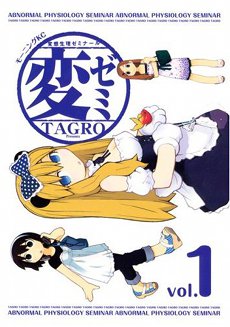
Hen Semi, also known as Abnormal Physiology Seminar, is a Japanese comedy manga series written and illustrated by TAGRO and is a remake of his earlier manga series, Hentai Seiri Seminar. Hen Semi has been serialized in Kodansha's Monthly Morning Two manga magazine since 2006. It has been adapted into an original video animation in 2010, as well as an anime television series in 2011.
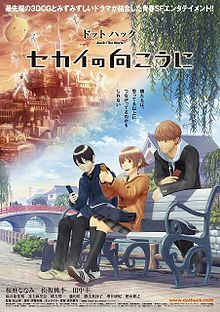
.hack//The Movie is a 2011 Japanese CGI anime film written by Kazunori Ito and directed by Hiroshi Matsuyama. It was released on January 21, 2012 in theaters and was released on DVD/Blu-ray on June 28, 2012. The Blu-ray release is a "hybrid" PlayStation 3 disc that includes the film and a fighting game called .hack//Versus.
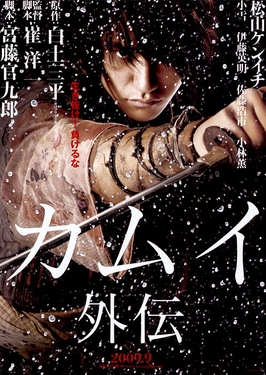
Kamui Gaiden (カムイ外伝) is a 2009 Japanese film directed by Yōichi Sai, based on Sanpei Shirato's manga series of the same title. The film is written by Sai and Kankurō Kudō, starring Kenichi Matsuyama in the title role. It premiered at Toronto International Film Festival on September 16, 2009, to mixed reviews. The English version was released as Kamui and the film was retitled Kamui: The Lone Ninja on the home video.

Gantz: O is a 2016 adult Japanese animated science fiction action film directed by Yasushi Kawamura and Keiichi Sato (chief), written by Tsutomu Kuroiwa, animated by Digital Frontier, and based on the manga series Gantz, which was written and illustrated by Hiroya Oku. It was released in Japan by Toho on October 14, 2016.

Nagasaki: Memories of My Son is a 2015 Japanese drama film directed by Yoji Yamada and starring Sayuri Yoshinaga and Kazunari Ninomiya. It was selected as the Japanese entry for the Best Foreign Language Film at the 89th Academy Awards but it was not nominated.

Kaiji, also known as Kaiji: The Ultimate Gambler, is a 2009 Japanese live-action film based on Gambling Apocalypse: Kaiji, the first part of the manga series Kaiji, written and illustrated by Nobuyuki Fukumoto. It is the first film of a trilogy directed by Tōya Satō and premiered in Japan on October 10, 2009. It was followed by Kaiji 2, released in 2011.
